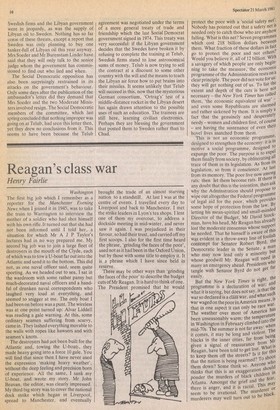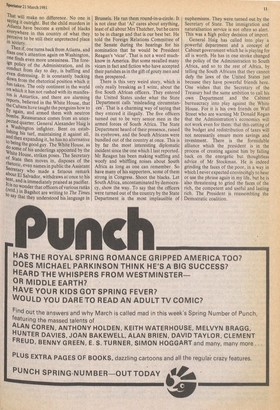Reagan's class war
Henry Fairlie
Washington The first big job which I remember as a reporter for the Manchester Evening News when I joined it in 1945, was to take the train to Warrington to interview the mother of a soldier who had shot himself with his own rifle.It turned out that she had not been informed until I told her, a situation for which Mr A J P Taylor's lectures had in no way prepared me. My second big job was to join a large fleet of destroyers in the mouth of the Clyde, each of which was to tow a U-boat far out into the Atlantic and send it to the bottom. This did not, as one naval officer said, seem quite sporting. As we headed out to sea, I sat in the wardroom with some rather pansy but much-decorated naval officers and a handful of drunken naval correspondents who laughed very loud at everything, and seemed to snigger at me. The only boat I had been on before was a punt. The wireless was at one point turned up: Alvar Liddell was reading a gale warning. At this, some ordinary seamen suffering from scurvy, came in. They lashed everything movable to the walls with ropes like hawsers and with seamen's knots.
The destroyers had siot been built for the Atlantic and, towing the U-boats, they made heavy going into a force 10 gale. You will find that since then I have never used the expression 'making heavy weather', without the deep feeling and precision born of experience. All the same, I sank my U-boat, and wrote my story. Mr John Beavan, the editor, was clearly impressed. My third big story was to cover the national dock strike which began in Liverpool, spread to Manchester, and eventually brought the trade of an almost starving nation to a standstill. At last I was at the centre of events. I travelled every day to Liverpool and back to Manchester. I met the strike leaders in Lyon's tea shops. I lent one of them my overcoat, to address a dockside meeting in mid-winter, and never saw it again. I was prejudiced in their favour, so had their trust, and carried off my first scoops. I also for the first time heard the phrase, 'grinding the faces of the poor', used not as it had been in the Oxford Union, but by those with some title to employ it. It is a phrase which I have since held in reserve.
There may be other ways than 'grinding the faces of the poor' to describe the budget cuts of Mr Reagan. It is hard to think of one. The President promised that he would protect the poor with a 'social safety net'. Nobody has pointed out that a safety net is needed only to catch those who are anyhow falling. What is this net? Seven programmes which cost 218 billion dollars between them. What fraction of these dollars in fact go to protect the poor and not others? Would you believe it, all of 12 billion. With a savagery of which people are only beginning to take the measure, the economic programme of the Administration rests on a clear principle. The poor did not vote for us: they will get nothing out of us. To list the extent and depth of the cuts is here nut necessary — the New York Times has called them, 'the economic equivalent of war' — and even some Republicans are alarmed and rather sickened by them. It is simPlY a fact that the genuinely and desperatelY needy — women and children first, of course — are having the sustenance of even their hovel lives snatched from them.
This is not an economic programme, designed to strengthen the economy: it is in motive a social programme, designed to expunge the poor. The purpose is to wipel them finally from society, by obliterating all trace of them in its legislation. As from itS legislation, so from it conscience. At last from its memory. The poor live now among rats: then let them become rats. If there is any doubt that this is the intention, then ask why the Adminstration should propose to wipe out altogether the Federal programme of legal aid for the poor, which provides some hope of protection from the law. BY, letting his mean-spirited and small-minden Director of the Budget, Mr David Stockman, have his head, Mr Reagan has already lost the moderate consensus whose support he needed. That he himself is aware of this was evident in a throw-away line of foolish contempt for Senator Robert Byrd, the Democratic leader in the Senate, a man who may now lead only a minority but whose goodwill Mr. Reagan will need 01 many an emergency ahead. Presidents who tangle with Senator Byrd do not get fur easily. But the New York Times is right, the programme is a declaration of war; and what it is saying, but does not say, is that the war so declared is a crars•war, and what such war waged on the poor in America means ,is that in one aspect it can only be race war. The weather over most of America ha5 been unseasonably warm: the temperature in Washington in February climbed into the mid-70s. The summer is not far away: when it comes, it may be long and violent. The blacks in the inner cities, far from being given a signal of reassurance from Mr Reagan, have been told to get lost. What s, to keep them off the streets? Is it for this that the nation is being rearmed? To shoo them down? Some think so. Anyone who thinks that this is an exaggeration 5ho11,1d ponder the murders of black children ifl Atlanta. Amongst the grief and the fear, there is anger, and it is racial. This may r seem to be irrational. The murderer o murderers may well turn out to be black That will make no difference. No one is saying it outright. But the child murders in Atlanta have become a symbol of blacks everywhere in this country of what they perceive to be still their unprotected place in society. Then if, one turns back from Atlanta, and fixes one's attention again on Washington, one finds even more uneasiness. The foreign policy of the Administration, and its conduct from day to day, is baffling and even distressing. It is constantly backing down from the rhetorical position which it has taken. The only continent in the world on which it has not rushed with its manifest°s is Antartica, and there are alarming reports, believed in the White House, that the Cubans have taught the penguins how to fly again, and armed them with neutron bombs. Reassurance comes from an unexPected quarter. General Alexander Haig is a Washington infighter. Bent on establishing his turf, maintaining it against all, and then expanding it, he has no alternative to being the good guy. The White House, as do some of his underlings appointed by the White House, strikes poses. The Secretary of State then moves in, disposes of the rhetoric, even names in public the Assistant Secretary who made a fatuous remark about El Salvador, withdraws at once to his tent, and is immediately praised as pacifier. It is no wonder that officers of various ranks (retd,) in Bagshot are writing to The Times, to say that they understood his language in Brussels. He ran them round-in-a-circle. It is not clear that 'Al' cares about anything, least of all about Mrs Thatcher, but he cares to be in charge and that is our best bet. He told the Foreign Relations Committee of the Senate during the hearings for his nomination that he would be President Reagan's 'vicar'. That is not a word muchknow in America. But some recalled many vicars in fact and fiction who have accepted their parishes as in the gift of gouty men and then prospered. There is this very weird story, which is only really breaking as I write, about the five South African officers. They entered the United States under what the State Department calls 'misleading circumstances'. That is a charming way of saying that they entered it illegally. The five officers turned out to be very senior men in the armed forces of South Africa. The State Department heard of their presence, raised its eyebrows, and the South Africans were bundled out of the country at once. This is by far the most interesting diplomatic incident since the one which I last reported. Mr Reagan has been making waffling and woofy and whiffling noises about South Africa as long as one can remember. So have many of his supporters, some of them strong in Congress. Shoot the blacks. Let South Africa, uncontaminated by democracy, show the way. To say that the officers were turned out of the country by the State Department is the most implausible of euphemisms. They were turned out by the Secretary of State. The immigration and naturalisation service is not often so alert. This was a high policy decision of import.
General Haig has called into play a powerful department and a concept of Cabinet government which he is playing for all is worth. He has in one stroke changed the policy of the Administration to South Africa, and so to the rest of Africa, by telling the South Africans that they cannot defy the laws of the United States just because they have powerful friends here. One wishes that the Secretary of the Treasury had the same ambition to call his own Department and the Cabinet bureaucracy into play against the White House. For it is his own friends on Wall Street who are warning Mr Donald Regan that the Administration's economics will not work even for them: that this cutting of the budget and redistribution of taxes will not necessarily ensure more savings and investment. There is the formidable alliance which the president is in the process of creating against him by falling back on the energetic but thoughtless advice of Mr Stockman. He is indeed grinding the faces of the poor, in a way in which I never expected convincingly to hear or use the phrase again in my life, but he is also threatening to grind the faces of the rich, the competent and useful and lasting rich. The President is reassembling the Democratic coalition.







































 Previous page
Previous page